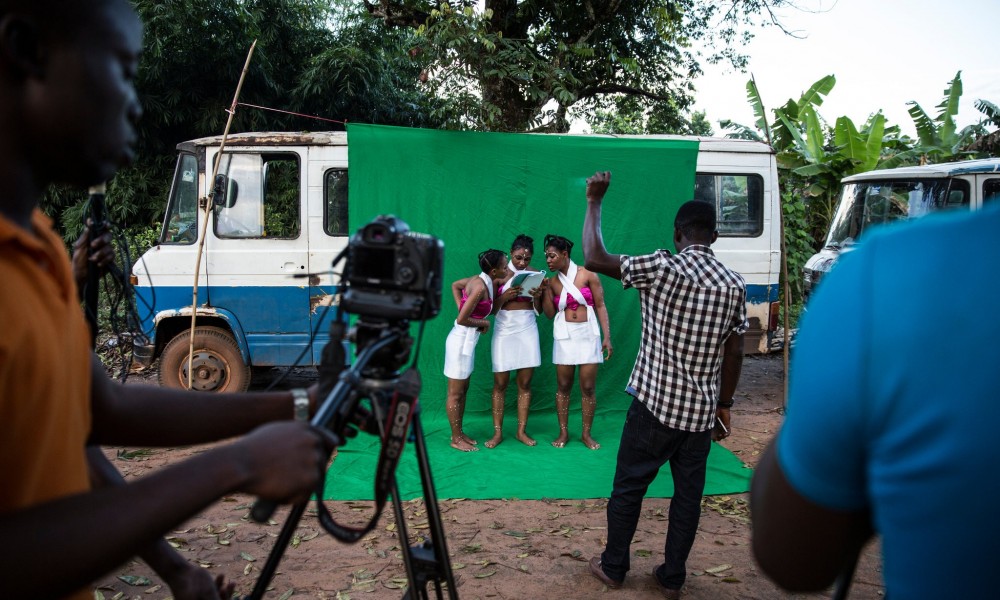Cinema in Nigerian style

Of all the arts the main one is...
Previously, technological backwardness and the general climate of poverty did not allow developing there a cinema industry, which has always been one of the most expensive forms of creativity. Therefore, even 30-40 years ago cinema theatres of this vast country could be counted on the fingers of one hand. These places with air conditioning, cafés and comfortable furniture were considered upscale, and people went there more often not to watch a movie, but to enhance their status. At the end of the 60s modern cinema classic Ola Balogun, being then an employee of the Embassy of France, at his own expense filmed a lyrical movie The Bridges of Paris, just a few people watched it in his homeland. As acknowledged by film scholars, it was the first Nigerian movie. Photo chathamhouse.org
Photo chathamhouse.org
For Balogun it was the beginning of a long journey: he left the diplomatic service, and immersed himself into art. His first movies referred to a real intellectual cinema, which has been always appreciated in the West, but Balogun could not evoke a response from his native spectators until he started filming the classic genre films based on folklore material. There he got a jackpot and the director became a true celebrity in his homeland - the audience loved his strong action movies and emotional melodramas, including the cult ones For Freedom! and The Power of Money.
Read also: Kano: Nigeria's oldest city
Breakthrough
Balogun gained not only fans, but also the supporters, but the high cost of film production did not give them the opportunity to accelerate and shoot films more often. Then, in the late 80s, two events made modern Nigeria the world's second most prolific film industry after India's Bollywood; and by the number of produced films for a long time it has been ahead of the US with its Factory of Dreams. The first was the technological revolution, and the ability to record movies on videotape, and then on digital bearers. The second one was the creation of national television, which strictly regulated the percentage of domestic and foreign products. So when in the 80s-90s residents of developed countries used videotapes to film their weddings and home videos, Nigerian filmmakers rolled up their sleeves to raise film industry and filled channels with their content, so that they were not deprived of license. Photo irs.iol.co.za
Photo irs.iol.co.za
These visually semi-amateur movies with simple plot were broadcasted for days on TV and spread out on videotapes like hotcakes. Movie theatres were still bohemian places, so most of the movies were filmed specifically for home viewing with the videorecorder or DVD in case of digital bearers. Living in Bondage, Bandit Queen, Blood River are not just local masterpieces, but the real blockbusters, which brought to their creators a lot of money. Budgets and incomes of those movies, of course, are not commensurate with American or European box office hits, but national recognition and turnover are worth much. Photo i.ytimg.com
Photo i.ytimg.com
Present day
Nowadays Nigeria continues to experience cinematic boom. Hundreds of movies are released every year, and almost all of them pay off. The average cost of producing a full-length feature is 15 thousand dollars. Shooting period is not more than two weeks, no one builds the scenery, everything is filmed in real apartments and real objects. Local stars Betsy Ikeme, Halima, Stephanie Okereke and others earn around 10 thousand dollars a month, that for Nigeria is huge money. Movies on CDs sold for 1-2 dollars, but the number of copies is striking - 200-300 thousand. All this allows Nollywood yielding about half a billion dollars a year in net income. Photo businessdayonline.com
Photo businessdayonline.com
By analogy with Los Angeles, the local elite populated fashionable district of Surulere in the former capital city Lagos. Hundreds of writers, directors and producers tirelessly launch new projects every day. Among the favourite genres there are thriller, political drama and romance story. As Nigerian filmmakers say, happy end is mandatory, because life is hard in Nigeria, so the viewer should forget about troubles and believe in a bright future of characters and his own, and the evil, whether bandit or corrupt officials, must be punished.Photo 1.bp.blogspot.com
Noteworthy that movies by the Nigerian producers enjoyed great popularity throughout Africa, because even experts and film critics say that among thousands of pictures you can find real diamonds that even today we can safely present in Cannes, and quantity is slowly turning into quality. Moreover, in Ghana and Liberia, where the authorities try to raise their own art, the authorities have banned movies made in Nigeria, and destroy CDs with movies, trying to protect their own producers. However, the Dark Continent is a huge market, so Nollywood dealers do not despair as their products are always in demand. Especially in recent years, they talk of a possible co-production with the Europeans and the Americans, because the economic success of Nigerian movies is attractive for the West, and who knows, maybe very soon people from all over the world will travel to Lagos to study at the local film school and learn how to make the national hit for a penny. Photo static01.nyt.com
Photo static01.nyt.com
Cover photo nytimes.com





















